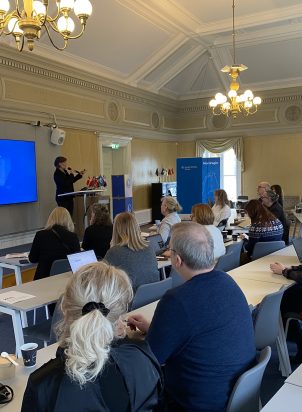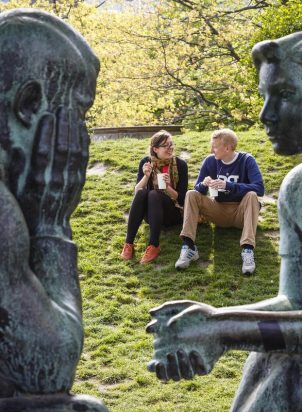The deadline for the Sustainable Development Goals (SDGs) is fast approaching. Nordregio brought together representatives from academia, civil society, government agencies, and municipalities for a webinar on the Nordic local perspective of what has been achieved, what remains to be done, and how the agenda should be shaped beyond 2030.
Anna Berlina from Nordregio presented preliminary findings from a study based on focus groups and interviews with Nordic municipalities and regions.
The preliminary findings show that the Sustainable Development Goals have served as a motivational driver for change in municipalities. While a lack of political leadership, along with declining interest and support at the international and national levels has posed challenges, the 2030 Agenda remains a powerful and relevant tool locally. To accelerate progress, stronger political backing is needed, said Anna Berlina.
Experiences from municipalities
The first panel consisted of representatives from Espoo (Finland), Tierp (Sweden), and Tromsø (Norway). Many of the study’s preliminary findings were reflected in their experiences.
Frida Johnson from Tierp noted that the SDGs have become a common framework for discussing sustainability. Tierp has used the goals as the foundation for its work, breaking them down into local targets and embedding them in steering processes and the municipal budget.
Helga Bårdsdatter Kristiansen from Tromsø highlighted the need to share tools and practices so that each municipality does not have to reinvent the wheel.
Representatives from all three municipalities emphasized the importance of integrating sustainability into everyday work rather than treating it as a separate task. This approach is crucial for implementing the 2030 Agenda at the local level.
Sustainability is not something you do when you have resources and when times are good – it is what makes good times possible, said Suvi Jäntti from Espoo.
Panel discussion and reflections
Next, Nina Weitz from the Stockholm Environment Institute and Sébastien Vauzelle from the UN Local2030 Coalition Secretariat offered reflections from academic and global perspectives.
Nina Weitz noted that while the SDGs have provided a shared language and framework for discussing sustainability, they have not worked as effectively as intended in driving change. Strengthening implementation will be a key challenge for the post-2030 agenda.
Sébastien Vauzelle emphasized the importance of advancing a systemic approach rather than relying on fragmented or siloed efforts. Localization of the goals is essential – working from the bottom up and involving multiple actors.
Future outlooks and next steps
The final panel looked toward the future, featuring Eveliina Kiema-Majanen from the Association of Finnish Municipalities and Anne Romsaas from the Norwegian Association of Local and Regional Authorities.
They highlighted the importance of building on what has worked well and ensuring that all municipalities can strengthen their efforts. Securing support from the national level will be crucial. Keeping a holistic view of the goals while also localizing them will remain key.
In the future, we need to link the SDGs more closely with AI, digitalisation and innovation. These can be real game changers in how we approach development across all levels, but we must communicate this more clearly and challenge national governments to take this perspective seriously, said Anne Romsaas.
Eveliina Kiema-Majanen added that local and national contexts shape how the goals are understood and implemented.
While the SDGs are a common language, we have different dialects. Localizing the SDGs means making them your own – communicating them in ways that are relevant to residents, staff, and the politicians who fund the SDG action, she commented.
A key message in the Nordregio study’s findings regarding the post 2030 agenda is to keep the 2030 Agenda, but modify it, re-prioritize parts of it and enhance the accountability mechanisms for implementation.







